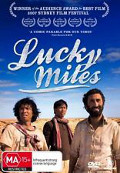
Directed by
Michael James Rowland
104 minutes
Rated MA
Reviewed by
Bernard Hemingway

Lucky Miles
Synopsis: It’s 1990 and a boat skippered by an Indonesian people smuggler deposits a rag-tag collection of Cambodians and Iraqis on a deserted beach in the north-west of Australia. They are told that just over the hill a bus will carry them to Perth. Of course it’s a lie. Although most of them are picked up by the authorities three of them are left to wander into the wilderness of the Pilbara.
Lucky Miles, the debut feature for Michael James Rowland, takes the familiar Outback comedy (eccentric characters, rusted tins sheds and red sand as far as the eye can see) and gives it an updating with the most contentious issue in Australian politics at the start of the new millennium – boat people. It’s a commendable effort albeit somewhat weighed down by its allegorical agenda,
The film pointedly sets up its three strangers in a strange land - Youssif (Rodney Afif), an Iraqi asylum seeker, Ramelan (Srisacd Sacdpraseuth), an Indonesian from the people-smuggling boat, and Arun (Keith Moraleda), a Cambodian looking for his Australian father. Their story is offset by the three none-too sharp army reservists Plank (Don Hany), Sgt O’Shane (Glenn Shea) and Tom (Sean Mununggurr) looking for them. The latter, along with some types in the local bar/general store, provide the Ocker element their sense of she’ll-be-right familiarity with their surroundings being in marked contrast to the estrangement of the three men who have no idea where they are. These two strands are added to in the form of the Indonesian boat's "captain" and his mate who are cast ashore with Ramelan when their boat sinks.
The trouble with this scenario is that that as the three lost, men who get the bulk of the screen-time, only share enough English to squabble their way across the Pilbara their verbal engagements are largely prosaic. The three reservists aren't really any better. On the other hand, Gerry (2002) is not. Though the landscape looks formidable, the men look remarkably spry especially as they appear to have no food (yet they light fires with the greatest of ease) and tramp cross the baked earth in the middle of the day.
The film is being promoted as a comedy but don’t expect to get laughs from a trio of international odd-balls. Rowland and his co-writer Helen Barnes don’t really get more than a few sputters of under-duress frustration out of the unwanted propinquity although there is one good visual gag late in the film when in the best Aussie spirit, Youssif manages to get a beaten-up ute working (though God knows where the petrol came from). The cynical people-smuggler-cum-pirate whose boat sinks also provides some chuckles but the reservists with their walkie-talkie are more tedious than amusing, too obviously Outback stereotypes.
For all that, the cinematography by veteran Geoff Burton is spectacular (with South Australia standing in for the Pilbara) despite being shot on Super-16, the physical emptiness serving to give room for reflection on our national myths – \ our place “at the end of the world”, the inhospitable character of the land with its overwhelming strangeness, the difference between our Outback image and the urbanized reality, as well as our condition as a cultural melting pot.
It is really these extra-filmic aspects which save Lucky Miles from being just another Ocker comedy..

Want more about this film?


Want something different?




